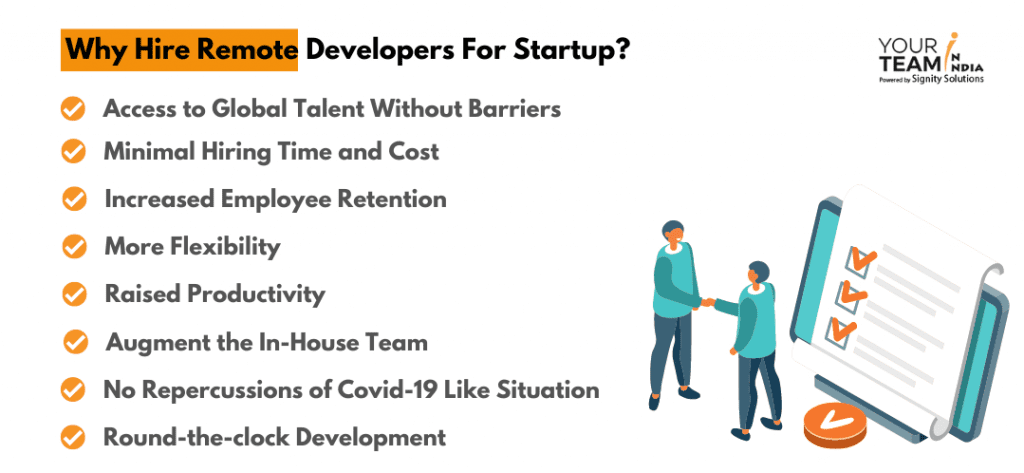Quick Summary: Onboarding remote developers means quick scalability for your business with fewer risks and overhead costs. Plus, with remote developers, you have access to greater productivity, increased employee retention, quick scalability, etc. Here are more benefits of starting your project with remote developers.
What is a remote developer? What could be the benefits of hiring remote developers? Why hire a remote development team for your startup? These are some of the questions that come to mind, especially when someone favors hiring remote development teams or engineers.
Remote developers have garnered attention from both passionate startups and conglomerates. Still, the question every startup needs to figure out the answer is when to have a remote team.
Well, there is no better time to hire developers than now. The global IT outsourcing market was valued at USD 31407.59 million in 2022 and is expected to grow at a CAGR of 5.76% during the forecasted period. This clearly outlines that companies of all sizes are looking for remote development teams to cater to their IT demands while retaining a certain degree of resilience.
Key Takeaways
- 72% of enterprises that established remote working policy witnessed a more productive workforce.
- In-house skill gaps can be easily filled by hiring remote developers and daily tasks can be accomplished more efficiently.
- Businesses benefits from time zone flexibility by receiving round-the-clock strategic development and support.
- 6 out of 10 employers think that hiring remote developers is a great way to save money.
As a Business Development Manager at Signity, I have had the pleasure of assisting several co-founders with their remote IT outsourcing needs. Through these experiences, I have eyewitnessed the benefits that our clients have gained by hiring remote developers and utilizing offshore models.
Herein, I'll show you what benefits remote developers bring to your startup and where to find them. Furthermore, practices to manage remote teams in a hassle-free manner.
Many Benefits of Hiring Remote Developers for Startup

Did you know the tech giant company GitLab once started as a remote team in 2011? GitLab's founder believed in the benefits of remote development and wanted to create a company that could attract and retain top talent globally.
So, if you are running a startup, you have every reason to outsource, and here are a few of them.
Hire remote developers who understand the importance of scrums and meetings.
1. Access to Global Talent Without Barriers
Hiring remote developers with the needed expertise and experience can be an uphill task. Often, this is true if you are based in the US, which is presently struggling with a significant tech talent crunch.
Hiring remote development widens your talent pool of IT expertise. For instance, if you are having challenges finding a full-stack developer locally, you will likely find it in India, where we are based.
2. Minimal Hiring Time and Cost
When hiring a remote engineer, you must go through the humdrum process of putting up ads, scheduling interviews, analyzing, shortlisting candidates, and onboarding. This is a time-consuming process, and time is a luxury that startups can't afford to misuse.
Instead, it's better to cut short the hiring process when you switch to a remote IT team. Then, everything is taken care of by your potential offshore development company.
3. Increased Employee Retention
Establishing remote work policies can significantly increase retention rates and employee loyalty.
Imagine a top performer employee of your company leaves; you'll need to spend significant time, money and resources to hire and train the replacement.
The will of the workplace is redrafted. According to recent research, companies that don't meet employee needs will have a tough time competing in the market and retaining their existing employees.
After all, employee turnover is expensive. So one quick fix working magic for us to keep our employees happy is letting them work anywhere and as long as they want, and besides, it doesn't affect their performance.
Recent survey analysis:
- 51% of jobseekers say they would switch to a job that allows them flexible timings
- 55% of remote workers would be looking for another job if they were not allowed to work remotely.
- 61% of remote workers would expect increased pay if they were no longer allowed to work remotely.
Recommended read: Choose The Right Model To Hire Remote Developers
4. More Flexibility
Startups often face pain with uncertainties during their inception days.
Ideally, it's essential to maintain a fluid organizational structure as the startup scales. However, this means hiring an in-house team of developers is not an ideal option. Indeed, it can be a substantial long-term operational cost.
In situations like these, hiring remote developers becomes an ideal option. You don't get tied up with long-term commitments as you only pay for the services you use.
5. Raised Productivity
A survey by Indeed found that 72% of companies with remote work policies say employees are more productive, whereas 22% stated that remote workers are as effective as in-house, and merely 3% say that remote workers are less productive.
While remote workers and in-house teams both have 40 hours a week, their reasons differ. According to a survey by Owl Labs, in-house employees work longer because it's needed, whereas remote teams work extra because they love what they do.
6. Augment the In-House Team
Hiring remote developers sounds pivotal in augmenting the in-house development team. After all, remote developers can bring crucial skills and technical expertise to a project. In addition, they can successfully bridge the gaps between in-house teams and remote developers, saving time and effort on repetitive tasks.
Thus, the in-house team can focus on more critical issues.
Recommended read: In-House vs Remote Developers: Pros and Cons
7. No Repercussions of Covid-19 Like Situation
Epidemics like COVID-19 don't knock on the door before coming. And these can significantly impact businesses that aren't digitized. This is what makes remote working the constant in the future.
When you have a remote team, you don't have to worry about such situations, even if they happen in the future. Remote developers stay unaffected by pandemics, lockdowns, and emergencies and have the potential to accommodate in a work-from-home environment easily.
8. Round-the-clock Development
Often, remote employees work from different locations and in different time zones, which allows businesses with continuous development support, maintenance, integration, and strategic support regarding deployment, ensuring a quicker time to market. Here are top tools to manage remote teams to achieve greater productivity effortlessly.
Also, you can schedule frequent meetings with the remote teams with an overlapping schedule to cater for development and quickly solve any technical hiccups.
Your company will be Future Ready - Remote Work Future.
According to TechCrunch - "Automatic, Buffer, InVision, and Zapier all have 100 to approximately 1,000 remote employees."
These stats clearly show that "remote work is the future, and it means you don't need to shift to a tech hub to run your business successfully".
With increasingly remote work, you should now be ready to set up these systems to stay abreast of the competition. Also, remember not to be the company that gets left behind because of not being able to attract the right talent to get the job done.
Tap into the Thriving Market of Digital Nomads
"The total number of digital nomads has ballooned to over 35 million, with 52% coming from the US."
Digital Nomadism - Project Untethered
The reason for the surge?
An amalgam of higher salary expectations, freedom and flexibility to work anywhere and anytime. Besides the growing popularity of digital nomadism, numerous people are quitting their jobs to explore the hidden world, freelance end route to making ends meet, or establish their startups simultaneously.
So, it's high time to capitalize on this movement and leverage global freedom by dismissing preconceived notions about "the workplace". Your team's quality analyst might be living in another country, but he'll be equally motivated to work hard on your project to support himself.
Simply put, digital nomad policies allow businesses to reach further in their talent search and tap into a rich, mostly untapped talent pool.
Plethora of Creativity for Project
There's no denying remote developers don't usually work on a single project; this way, they have exposure to multi-dimensional verticals, allowing them to think creatively.
So, when you work with a remote development team, you continuously welcome new ideas that help you manage the team successfully.
Finally… Remote Working is the New Constant that Needs to Be Embraced Wholeheartedly.
Hiring a remote development team or a skilled remote developer not just saves time but instead cuts your operational costs too. For example, you don't need to pay for infrastructure, furniture etc. Moreover, no need to Yelp on employees for pity reasons like being late and health and transport benefits.
Remote developers come easy on your pocket with untold benefits. Therefore, it's right to say that hiring a remote developer benefits not only by adding flexibility to your operations but everything from lower costs to access to the best talent globally.
Talk to us to make your idea an undeniable success in the shortest time.

Frequently Asked Questions (FAQs)
How can remote developers benefit my company's productivity?
Are remote developers more cost-effective compared to in-house developers?
Can remote developers provide the same level of collaboration and communication as in-house developers?
What steps can be taken to foster a positive remote work culture for developers?
*Communicate goals clearly
*Get frequent feedback
*Use tools and platforms to increase productivity
*Support professional growth
*Create connections between team members







